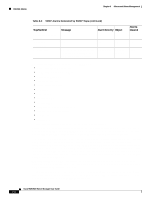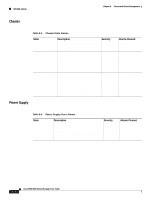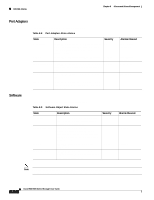Cisco 6506-E User Guide - Page 441
Attribute Value Alarms, Chassis
 |
UPC - 882658182617
View all Cisco 6506-E manuals
Add to My Manuals
Save this manual to your list of manuals |
Page 441 highlights
Chapter 8 Alarms and Alarm Management C65/76M Alarms Attribute Value Alarms Because the Catalyst 6000 family switches and the Cisco 7600 series Internet Router running IOS do not support SNMP traps for hardware component failures or changes, the C65/76M software polls certain object attributes to determine hardware status. If the polled value indicates a failure, the C65/76M software raises an appropriate alarm. The following objects have one or more attributes polled for status information: • Chassis • Power Supply • All Modules/Port Adapters • Software Chassis Table 8-10 describes the Chassis object attribute alarms. Table 8-10 Chassis Attribute Alarms Attribute Core Temperature Status = ok Message/Description "C6576M Chassis Core Temperature Status is ok. Core temperature is within normal operation limits." Severity Normal Core Temperature Status = error Core Temperature Status = critical Fan Status = ok "C6576M Chassis Core Temperature Status is error. The core chassis temperature is greater than the normal operating temperature range." "C6576M Chassis Core Temperature Status is critical. The switch is going to shutdown due to excessively high core temperature." "C6576M Chassis Fan Status is ok." Major Critical Normal Fan Status = other Fan Status = minorFault Fan Status = majorFault Slots Used "C6576M Chassis Fan Status is other." Minor "C6576M Chassis Fan Status is minorFault." "C6576M Chassis Fan Status is majorFault." "C6576M Chassis Used Slots has changed. The switch line card configuration has changed." A change in this value initiates a subchassis rediscovery. Major Critical Major Alarms Cleared Core Temperature Status = error Core Temperature Status = critical Core Temperature Status = critical Core Temperature Status = error Fan Status = other Fan Status = minorFault Fan Status = majorFault Fan Status = minorFault Fan Status = majorFault Fan Status = other Fan Status = majorFault Fan Status = other Fan Status = minorFault None Cisco 6500/7600 Series Manager User Guide 8-13















